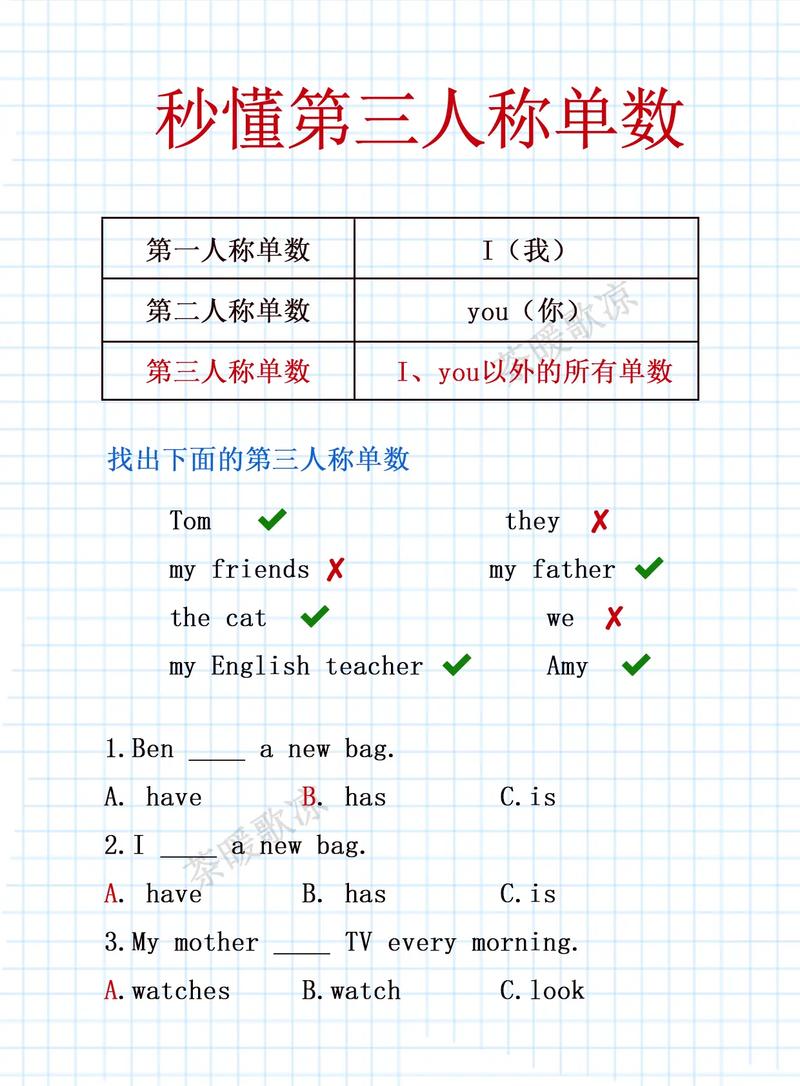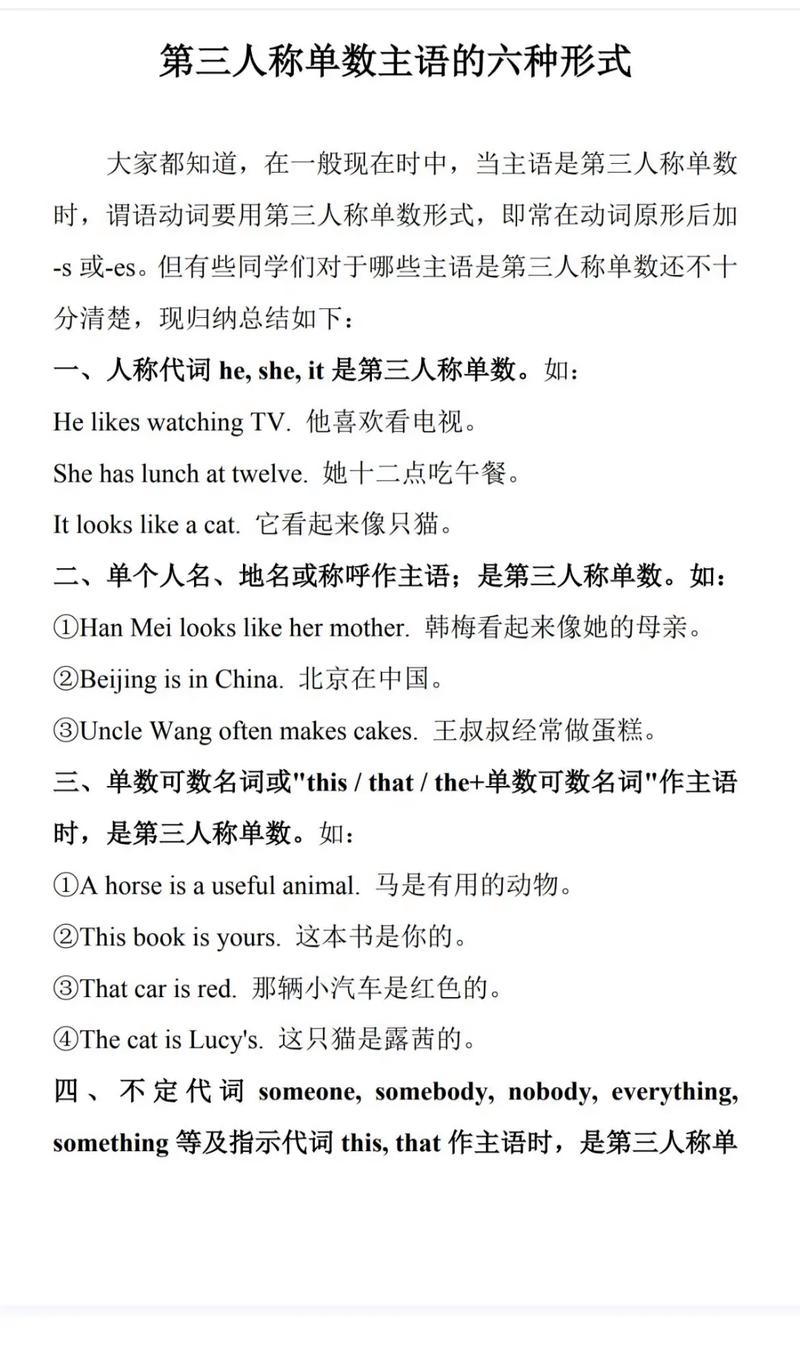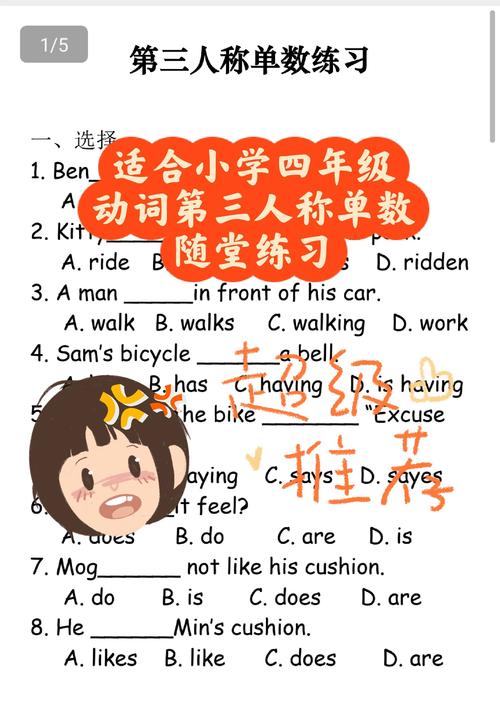1. be动词:is 例如:He is happy. 例如:She is a doctor. 例如:It is cold today.
2. have动词:has 例如:He has a car. 例如:She has a brother. 例如:It has four legs.
3. do动词:does 例如:He does his homework every day. 例如:She does not like vegetables. 例如:It does not matter.
4. go动词:goes 例如:He goes to school by bus. 例如:She goes to the gym every morning. 例如:It goes without saying that he is smart.
5. see动词:sees 例如:He sees his friends every weekend. 例如:She sees the movie with her family. 例如:It sees the light of day for the first time.
6. eat动词:eats 例如:He eats breakfast at 7 am. 例如:She eats a lot of fruits and vegetables. 例如:It eats up all the resources.
7. sleep动词:sleeps 例如:He sleeps for 8 hours every night. 例如:She sleeps with the windows open. 例如:It sleeps all day.
8. work动词:works 例如:He works hard to earn a living. 例如:She works as a teacher. 例如:It works efficiently.
9. play动词:plays 例如:He plays football with his friends. 例如:She plays the piano beautifully. 例如:It plays an important role.
10. talk动词:talks 例如:He talks a lot about his job. 例如:She talks to her friends on the phone. 例如:It talks to the audience.
请注意,这些动词的方式可能会因时态和语态的改变而有所不同。此外,还有一些动词是双写最终一个字母后加上“es”的,例如“run”变成“runs”。
深化解析“go”的第三人称奇数方式

在英语学习中,动词的时态和单复数改变是根底且重要的部分。本文将深化解析“go”的第三人称奇数方式,协助读者更好地把握这一语法点。
一、什么是“go”的第三人称奇数方式?

二、“go”的第三人称奇数方式在语句中的使用

1. He goes to school by bike.(他骑自行车上学。)
2. She goes shopping every weekend.(她每个周末都去购物。)
3. It goes without saying that exercise is good for health.(训练有益健康,这是显而易见的。)
在这些比如中,主语分别是第三人称奇数的“he”、“she”和“It”,因而动词“go”都使用了第三人称奇数方式“goes”。
三、“go”的第三人称奇数方式与其他时态的联系
1. 一般现在时:表明经常性或习惯性的动作。
2. 一般曩昔时:表明曩昔某个时刻产生的动作或存在的状况。
3. 一般将来时:表明将来某个时刻即将产生的动作或存在的状况。
例如:
1. He goes to school every day.(他每天上学。)
2. He went to school yesterday.(他昨日上学了。)
3. He is going to school tomorrow.(他明日要去上学。)
在这些比如中,尽管时态不同,但动词“go”的第三人称奇数方式“goes”在语句中的使用是共同的。
把握“go”的第三人称奇数方式关于英语学习者来说至关重要。经过本文的解析,信任读者现已对“go”的第三人称奇数方式有了更深化的了解。在往后的英语学习中,期望我们可以灵活运用这一语法点,进步自己的英语水平。
英语学习,动词时态,第三人称奇数,go,goes
未经允许不得转载:全栈博客园 » go的第三人称奇数,深化解析“go”的第三人称奇数方式

 全栈博客园
全栈博客园 r言语深度学习,R言语深度学习入门攻略
r言语深度学习,R言语深度学习入门攻略 go输入法下载,Go输入法下载——全方位体会高效输入的智能输入法
go输入法下载,Go输入法下载——全方位体会高效输入的智能输入法 r言语和c言语哪个难
r言语和c言语哪个难 在线java
在线java mac装备java环境变量
mac装备java环境变量 python怎样念,Python言语发音及遍及介绍
python怎样念,Python言语发音及遍及介绍











